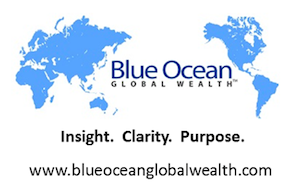“How we spend our days is, of course, how we spend our lives,” said author Annie Dillard.
In fact, time is our most precious commodity. We regularly use words like “spend,” “kill,” and “waste” when we explain how we use the finite number of hours in our days. And the adage, “time is money,” certainly resonates when taking charge of financial affairs.
So, how can you use your time wisely when it comes to wealth management?
1. Be in the market for the long haul—market timing versus time in the market. In my opinion, being savvy about your financial future is not about trying to predict the best time to buy and sell stocks or bonds so that you can beat the market. Nor is it about determining the best time to start investing. Focus on the big picture, longevity, and creating an integrated financial plan that connects your life goals with your investments. Emphasize quality within your investment portfolio and plan to invest in the market for the long haul.
2. Keep your eye on the prize. Are you about to send your child off to college, or are you evaluating when you want to retire? Procrastinating on planning and saving can limit your options. Use a strategic financial-planning framework to make it easier to prioritize and take action. For example, would you rather retire at age 57 with a pension of $4,600 per month, or wait until age 62 with a pension of $5,100 per month? There is no right or wrong answer. The right answer for you depends on your individual and family situation.
3. Understand the process of investing. The biggest mistake people make is to postpone saving until they’ve mastered the art of investing—and that can take a lifetime. Accept that you don’t have to be an expert on all types of investments before you start saving for your future. Here are some strategies to help you harness your full potential:
- If the idea of selecting good investments is overwhelming or confusing, just focus on the habit of saving. Activities we repeat on a regular basis become habits that we tend to perform almost unconsciously.
- If you’re enrolling in an employer-sponsored retirement plan, and you don’t feel comfortable making investment choices immediately, consider a balanced fund (generally a mix of stocks, bonds, and cash) or a target-date retirement fund. In a target-date fund, your contributions are spread across different types of investments based on how many years you are from retirement, with the investment allocation becoming more conservative as you age. Review your 401(k) plan to evaluate your contribution rate and investment performance, and make adjustments on an annual basis.
- If you don’t have an employer-sponsored retirement plan, or if you’re self-employed, you can accumulate wealth for retirement in an IRA, Roth IRA, SEP IRA, SIMPLE IRA, or one of the many other types of tax-deferred retirement accounts.
4. Be resilient. The key to accomplishing this goal is to cultivate your investment knowledge and acumen while giving yourself permission to make some mistakes. And don’t beat yourself up over past decisions! In my experience, I have seen too many people make long-term financial decisions in isolation. In his book Aging Well, Harvard University psychologist George Vaillant describes resilient individuals as resembling “a twig with a fresh, green living core.” He explains that when twisted out of shape, such a twig bends, but it does not break; instead, it springs back and continues growing. Resilience is an important component of prudent wealth management.
5. Have a balanced spending approach. Being balanced isn’t about depriving oneself, or simply delayed gratification. It’s about balancing consumption today with anticipated consumption in the future. While planning for the future is prudent, we all have to live life a little now!. For me, my green tea latte habit might seem extravagant to others, but when I have to get up early to take my son to swim practice, it brings serenity to my day.
6. Identify your core values. Helping clients identify what they want most from their lives is the first step in helping them achieve their financial goals. It sounds simple, but all too often it’s a challenge to know what you want, let alone to adopt a financial planning strategy that strengthens your resilience and helps you achieve your goals. That’s where an integrated financial plan comes in:
- Creating a financial plan that helps you see the big picture and establish short- and long-term life goals is a crucial step in mapping out your financial future.
- When you have a strategy and a financial plan, it’s easier to make financial decisions and stay on track to meet your goals. The planning experience should provide peace of mind, insight, and clarity to you and your family.
- Financial planning also helps you understand the impact that each financial decision has on other areas of your financial life. For example, increasing contributions to your employer-sponsored retirement plan affects your cash flow, taxes, investment portfolio, and retirement plan.
- Adopting an integrated approach to managing your wealth will undergird your financial decisions with purpose and confidence, which will also empower you to better navigate through life transitions.
For more information, visit www.blueoceanglobalwealth.com.

Marguerita M. Cheng, CFP® is the CEO of Blue Ocean Global Wealth. She is passionate about ensuring that her clients have clarity and confidence about planning for their financial future. Marguerita empowers her clients to take control of their financial lives. As a CFP Board Ambassador, she helps educate the public, policymakers, and the media about the benefits of competent, ethical financial planning.
In 2017, she was named the #3 Most Influential Financial Advisor in the Investopedia Top 100 and a Woman to Watch by InvestmentNews.
Marguerita’s mantra is “So many people spend their health to gain wealth, and then have to spend their wealth to regain their health” (A.J. Reb Materi).
Securities offered through Private Client Services, LLC. Member FINRA | SIPC. Advisory products and services offered through Blue Ocean Global Wealth, a registered investment advisor. Private Client Services, LLC and Blue Ocean Global Wealth are not affiliated entities.
Blue Ocean Global Wealth intends that this article will be viewed for informational purposes only. The information in this material is not intended as tax or legal advice. It may not be used for the purpose of avoiding any federal tax penalties. Please consult legal or tax professionals for specific information regarding your individual situation. The opinions expressed and material provided are for general information, and should not be considered a solicitation for the purchase or sale of any security.
Originally published at www.beinkandescent.com


